|
|
|
Sort Order |
|
|
|
Items / Page
|
|
|
|
|
|
|
| Srl | Item |
| 1 |
ID:
174637
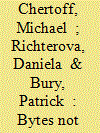

|
|
|
|
|
| Summary/Abstract |
Rapoport's conceptualization of the last, religious wave of four global waves remains highly influential. But it, and other typologies, have placed too little emphasis on the influence of information and communication technologies (ICTs) on the evolution of global jihadist activities. This article makes two new contributions by developing both a new ICT-based typology for understanding jihadist evolutions, and by focusing on successful attacks. Our central argument is that ICTs’ impact on global jihadism has facilitated dramatic transformations of its strategy, organization and tactics since the 1990s, and that these can be understood as four overlapping iterations. ‘Jihadism 1.0’ describes the hierarchical, top-down directed and overseas financed and trained terrorist organizations that conducted iconic attacks at the turn of the millennium. Jihadism has since evolved into ‘Jihadism 2.0’ and then ‘Jihadism 3.0’. Jihadism 2.0 recognizes that a number of smaller, coordinated attacks can have a global impact. Jihadism 3.0 is inspired terrorism that has no links to the central terror organization, utilizing individuals and crude tactics. Finally, jihadism is evolving toward ‘Jihadism 4.0’, or cyberterrorism. We argue this typology provides a useful basis for scholars and practitioners to conceptualize the ICT dynamics influencing global jihadism, and these may be applicable to other global terrorists. The conclusion analyses how counter-terrorism services can respond to these evolutions and charts areas for future research.
|
|
|
|
|
|
|
|
|
|
|
|
|
|
|
|
| 2 |
ID:
165026
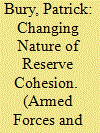

|
|
|
|
|
| Summary/Abstract |
For too long military cohesion scholars have focused on regular infantry forces. This article examines the impact of the Future Reserves 2020 (FR20) policy on cohesion, professionalism, and discipline among British reserve logisticians. In doing so, it makes three significant contributions to the cohesion literature. Firstly, addressing scholars’ almost exclusive focus on regular infantry, it presents the first academic study on cohesion in British reserve logistics forces. Secondly, in detailing how cohesion in these forces is based on interpersonal rather than professional bonds, it argues that the locus of cohesion and discipline in these forces is different to that recently identified in the regular professional infantry. Thirdly, the article argues that while FR20 is gradually changing many of British reserve norms, the organizational realities of reserve service continue to limit the policy's impact. The evidence presented may be theoretically applicable to other reserve and noncombat forces in future cohesion research.
|
|
|
|
|
|
|
|
|
|
|
|
|
|
|
|
| 3 |
ID:
178616
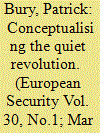

|
|
|
|
|
| Summary/Abstract |
There is growing evidence that simultaneous to the Revolution in Military Affairs (RMA), a less obvious, but equally profound, Revolution in Military Logistics (RML) has occurred that shapes and underpins western military effectiveness. However, there has been no conceptualisation of this RML nor its wider effect on Western force structures. This article addresses this gap in the security literature. Using an interdisciplinary literature review and case studies, it makes two central contributions: first, it details how western military logistics systems and practises have transformed following post-Fordist principles in the last two decades. In doing so, second, it contributes a major new conceptual framework to the military logistics and security studies literature. Finally, the implications of these processes for military effectiveness are examined, with the conclusion asserting that the cumulative effect of this post-Fordist RML has potentially increased western militaries’ strategic vulnerability.
|
|
|
|
|
|
|
|
|
|
|
|
|
|
|
|
| 4 |
ID:
167117


|
|
|
|
|
| Summary/Abstract |
Since 2001 there has been an increase in the use of reserve forces in conflicts sparking a number of organizational transformations when it comes to reserves. In Britain, the Future Reserves 2020 (FR2020) transformation was a cornerstone of recent defence policy. Yet, the scholarly work on military innovations has ignored reserve forces. This article examines why and how the recent attempt to transform the British Army Reserve was undertaken, and analyses its outcome. In doing so, this article contributes a major new case-study to the literature focused on civilian-directed peacetime innovation and the impact of intra-party and intra-service politics upon it. Firstly, we originally examine how intra-party political motivations were the primary initiator of the innovation. Secondly, contrary to previous intra-service rivalry explanations, we argue that our case is a compelling example of intra-service rivalry between components rather than branches, and over manpower and organizational structure rather than technology and visions of victory. Finally, addressing the lack of theory in innovation studies, we show how the transformation followed post-Fordist principles to address its political, ideological and financial drivers. We conclude that numerous innovation processes can be operant at different times, and that FR2020 has been frustrated by the interaction between these processes.
|
|
|
|
|
|
|
|
|
|
|
|
|
|
|
|
| 5 |
ID:
161523
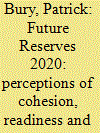

|
|
|
|
|
| Summary/Abstract |
The British Army Reserve, and in particular its logistics component, is currently undergoing profound organisational transformation as part of the Future Reserves 2020 (FR20) program. Yet, to date there has been no sustained quantitative analysis of perceptions of cohesion, readiness and morale in the Army Reserve. Moreover, there has been little quantitative examination of FR20’s impact to date. This paper addresses these gaps in the literature by undertaking an examination of the above variables using survey data from a representative sample of AR logistics soldiers collected longitudinally. It finds that cohesion is highly important in explaining variance in perceptions of readiness and morale, and that perceptions of cohesion, readiness and morale are relatively high in the force. Nevertheless, the data indicates that FR20 has failed to increase these significantly over time. Similarly, it finds that confidence in FR20 delivering increased military capability is also declining. These findings are important for understanding FR20’s impact to date and future trajectory.
|
| Contents |
The British Army Reserve, and in particular its logistics component, is currently undergoing profound organisational transformation as part of the Future Reserves 2020 (FR20) program. Yet, to date there has been no sustained quantitative analysis of perceptions of cohesion, readiness and morale in the Army Reserve. Moreover, there has been little quantitative examination of FR20’s impact to date. This paper addresses these gaps in the literature by undertaking an examination of the above variables using survey data from a representative sample of AR logistics soldiers collected longitudinally. It finds that cohesion is highly important in explaining variance in perceptions of readiness and morale, and that perceptions of cohesion, readiness and morale are relatively high in the force. Nevertheless, the data indicates that FR20 has failed to increase these significantly over time. Similarly, it finds that confidence in FR20 delivering increased military capability is also declining. These findings are important for understanding FR20’s impact to date and future trajectory.
|
|
|
|
|
|
|
|
|
|
|
|
|
|
|
|
| 6 |
ID:
176260


|
|
|
|
|
| Summary/Abstract |
In this article, Patrick Bury and Michael Chertoff argue that the re-emergence of near-peer competition and the increasing complexity and pace of events in the next decade mean that Western services must improve their strategic intelligence collection, analysis and information exchange to focus on increasing strategic threats. Simultaneously, the continuing evolution of terrorism will require counterterrorism intelligence to also adapt.
|
|
|
|
|
|
|
|
|
|
|
|
|
|
|
|
| 7 |
ID:
155822
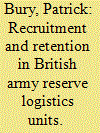

|
|
|
|
|
| Summary/Abstract |
The British Army Reserve (AR), and in particular its logistics component, is undergoing profound changes. The Future Reserves 2020 policy aims to expand the AR and make it more deployable on operations. However, to date, FR20 has struggled to attract the recruits required to man this more deployable reserve force, despite recruitment campaigns offering increased monetary benefits. This study sampled AR logistics soldiers’ reasons for joining, remaining in service, and mobilizing when deployed. Consistent with the previous research, the study found that soldiers who joined for institutional reasons were more associated with longer career intentions and mobilizing for intrinsic reasons. Soldiers who joined for occupational reasons were less satisfied with all elements of reserve service and deployed in order to fulfill their contracts. These trends suggest that recruitment campaigns that stress the pecuniary benefits of reserve service may attract soldiers less committed to reserve service and deployments and who are harder to retain.
|
|
|
|
|
|
|
|
|
|
|
|
|
|
|
|
|
|
|
|
|